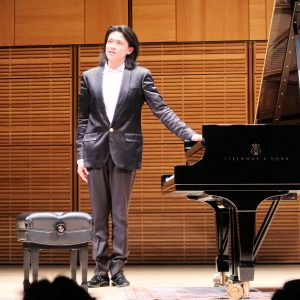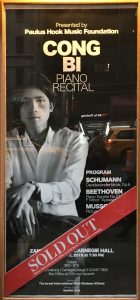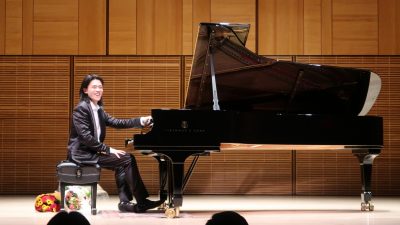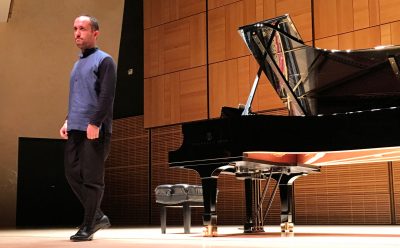Tiffany Poon is one of the first classical pianists to vlog about her life as a pianist.
She is an engaging communicator and works hard to expand her following; see my article Pianist Tiffany Poon meets Fans in NYC.
The resulting fan engagement has accelerated Tiffany’s social media presence to critical mass, bringing her invitations to perform around the world. With almost 110k YouTube followers at the time of writing, Tiffany’s concerts have sold out in places as diverse as Singapore and Brazil.
Given her popularity, I was lucky to get a seat at Tiffany’s very first house concert on April 20th 2019, hosted by Craig Maynard’s Core Memory venture in Rhode Island. Although 180 miles from my home, this was nothing compared with the distance some people traveled for this concert.
OMG it’s Tiffany!
When Tiffany walked through the audience to the piano, everyone went a little crazy. She was exactly the same in person as in her vlogs, except that instead of her usual low-key attire, she wore a dazzling scarlet outfit and golden heels. I felt like we were watching the birth of a star.
Bach: French Suite No. 5, BWV 816
Tiffany’s Bach was a sublime ice-breaker, sweetly colored by subtle, sometimes rapid pedal. Her voicing was fluid, using finely controlled dynamics to weave the left hand to the front and back of the sound stage. I’ve heard crisper baroque ornamentation, but I prefer Tiffany’s warmer, less clinical interpretation.
Haydn: Keyboard Sonata in E Flat Major, Hob. XVI:52
This work (Haydn’s last) is a kaleidoscope of contrasts which gave Tiffany lots to work with. She brought out the essence of this spirited, alternately grand and cheeky work, earning rousing applause from her audience.
Chopin: Barcarolle in F Sharp Major, Op 60
Tiffany played this work at the 2015 Chopin Competition in Warsaw. Her Rhode Island performance in 2019 was identical in pace, with a little more sparkle and less angst. Taking into account different venues, pianos, and recording equipment, these performances were comparable. Tiffany knows how she wants to play the Barcarolle and is remarkably consistent in her delivery.
Chopin: Nocturne in C minor Op. 48, No. 1
Few pianists are able to evoke the full darkness of the C minor Nocturne. In Rhode Island, Tiffany brought gloom to the forefront with her deep left hand in the opening. However some elongated phrasing as the work shifted from minor to major blunted the edge of this work. For me there was a bit too much piu lento, making for more sweetness than called for. But these are personal preferences and do not detract from Tiffany’s sumptuous performance. Hers was a nuanced interpretation, where raw grief is offset by (to coin a phrase) natural beauty.
Chopin: Nocturne in E minor Op. 72, No. 1
The E minor Nocturne is overshadowed by Chopin’s better-known works. But on this rainy Rhode Island evening, Tiffany Poon gave a stunning performance of this melancholy work that had those exquisite dissonances tugging at the soul. She was uncharacteristically restrained in her gestures, allowing the music to work on us without distraction from the performer. At the end her right arm crossed her left to play the final note, a period at the end of a very profound statement by this remarkable young pianist.
Chopin: Ballade No. 4 in F minor Op. 52
This beloved work was a good choice to close Tiffany’s concert. Not as dolorous as the preceding Nocturne, it is more challenging and complex. For Ms. Poon here was an opportunity to show once again the range of her talent. As we watched, the music seemed to take over the pianist, shaking head her like a rag doll. In slower segments her arms floated above the keyboard like those of a ballerina. This was a totally immersed performance by Tiffany that must have used every muscle in her body.
Encores: Liszt, Schumann
Tiffany played two encores. The first needs no introduction, she said (Liszt: Liebestraum no. 3). My neighbor tapped me on the shoulder to find out what it was. The second (Schumann: Träumerei) was by her favorite composer, she hinted. This reviewer recognized it instantly, but had to browse YouTube to find its name!
This is a common disconnect between artist and audience. There will always be someone who needs to be told. At a home concert we can ask, but at a major venue such as Carnegie some folk may leave not knowing what you played! Keep this in mind during your many future encores, Tiffany!
Closing Thoughts
This was Tiffany’s first house concert, and she was entertainingly and characteristically frank about not knowing protocols for taking bows and going offstage. After the performance, she sat at the piano and chatted with us for a lengthy period, taking questions and making no effort to bring things to a close.
This generosity of spirit will serve Tiffany well, although it may be harder to maintain once she is touring as a world class concert pianist. After this evening in Rhode Island, I have no doubt that she is capable of achieving this dream.
I was impressed by the Core Memory venue, an airy performance space with excellent lighting and good acoustics. Our host Craig Maynard did a great job setting this up. Events are open to the public but have limited seating, so sign up early!







You must be logged in to post a comment.